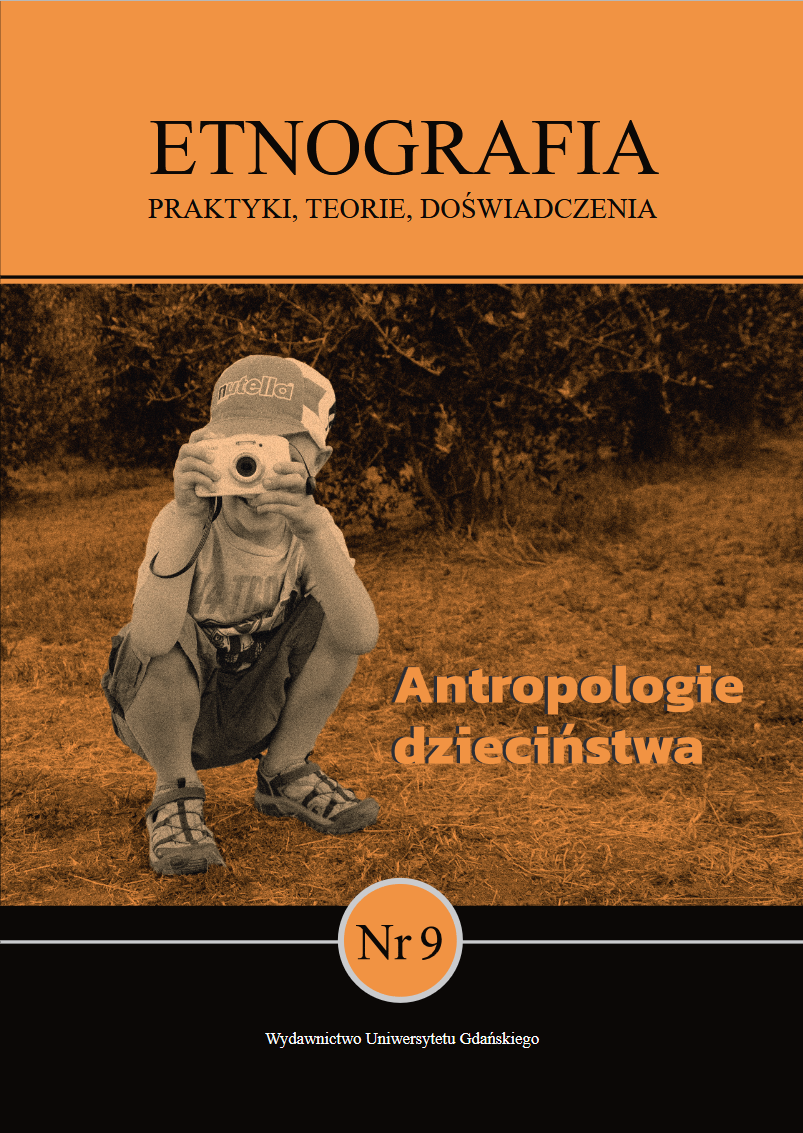„Wszyscy wolą kiedy jest po równo”. Opieka naprzemienna z perspektywy dzieci
DOI:
https://doi.org/10.26881/etno.2023.9.14Keywords:
joint physical custody, childhood studies, child custody, children’s rightsAbstract
In April 2022, the Polish Children’s Ombudsman publicly addressed the Minister of Justice, demanding changes in family law regarding child custody post-parental separation. The Ombudsman pointed out the lack of a legal definition of joint physical custody (JPC) and suggested there should be a clear definition and associated regulation. The Ombudsman’s address is one part of the debate on JPC that has recently emerged in Poland. Politicians, mothers, and fathers are actively engaged in the debate, with each of their voices well represented. Both supporters and opponents of joint physical custody claim that their main concern is the best interest of the child. However, no attempts have been made to listen to children’s opinions about custodial arrangements.
This article is based on interviews with 23 children living in JPC. I asked the children about their everyday experience of home and belonging and their relationships with their parents, siblings, and parents’ new partners. I also asked their opinions on how custodial arrangements should be made to suit them. The interviewees complained about the inconvenience of frequent moves but also stated that living with their mother and father interchangeably allowed them to be as close to each of the parents as they desired. For this reason, the interviewees considered JPC a preferable solution after divorce.
Downloads
References
Amato, P.R., Booth, A. (1997). A generation at risk: Growing up in an era of family upheaval. Cambridge: Harvard University Press.
Amato P. R. (2001). Children of divorce in the 1990s. An update of the Amato & Keith (1991) meta-analysis. Journal of Family Psychology, 15(3), 355–370. https://doi.org/10.1037/0893-3200.15.3.355.
Archard, D., Skivenes, M. (2009). Balancing a child’s best interest and a child’s views. The International Journal of Children’s Rights, 17(1), 1–21. https://doi.org/10.1163/157181808X358276.
Bergström, M. Fransson, E., Modin, B., Berlin, M., Gustafsson, P.A., Hjern, A. (2015). Fifty moves a year: Is there an association between joint physical custody and psychosomatic problems in children? Journal of Epidemiology and Community Health, 69(8), 769–774. https://doi.org/10.1136/jech-2014-205058.
Bjarnason, T., Arnarsson, A. (2011). Joint physical custody and communication with parents: A cross-national study of children in 36 Western countries. Journal of Comparative Family Studies, 42(6), 871–890. https://doi.org/10.3138/jcfs.42.6.871.
Carlsund, A., Erikson, U., Sellström E. (2013). Shared physical custody after family split-up: Implications for health and well-being in Swedish schoolchildren. Acta Pædiatrica, 102(3), 318–323. https://doi.org/10.1111/apa.12110.
Czech, B. (2011). Pojęcie dobra dziecka. W: K. Piasecki (red.), Kodeks rodzinny i opiekuńczy. Komentarz (s. 291–368).Warszawa: LexisNexis.
Cieśliński, M. (2015). Praktyka sądowa wysłuchiwania małoletnich w postępowaniach cywilnych w kontekście idei przyjaznego wysłuchiwania dziecka (komunikat o wynikach badania). Prawo w działaniu: Sprawy cywilne, 24, 221–236.
Domański, M. (2015). Orzekanie o pieczy naprzemiennej w wyrokach rozwodowych. Prawo w działaniu: Sprawy cywilne, 25, 97–148.
Grunow, D., Evertsson, M. (red.) (2016). Couples’ transitions to parenthood: Analysing gender and work in Europe. Cheltenham: Edward Elgar.
Hammersley, M., Atkinson, P. (2000). Metody badań jakościowych. Warszawa: Wydawnictwo Naukowe PWN.
Lansford, J. (2009). Parental divorce and children’s adjustment. Perspectives on Psychological Science, 4(2), 140–152. https://doi.org/10.1111/j.1745-6924.2009.01114.x.
Kamińska, K. (2020). Joint shared custody of children after parental separation: A Polish perspective. Eastern European Journal of Transnational Relations, 4(2), 87–106. https://doi.org/10.15290/eejtr.2020.04.02.05.
Kehily, M.J. (2008). Wprowadzenie do badań nad dzieciństwem, przeł. M. Kościelniak. Kraków: WAM.
Neale, B., Wade, A., Smart, C. (1995). ‘I just get on with it’: Children’s experiences of family life following parental separation or divorce. Centre for Research on Family, Kinship, and Childhood Working Paper, Vol. 1.
Nielsen, L. (2011). Shared parenting after divorce: A review of shared residential parenting research. Journal of Divorce and Remarriage, 52(8), 586–609. https://doi.org/10.1080/10502556.2011.619913.
Nielsen, L. (2013). Shared residential custody: Review of the research (Part II of II). American Journal of Family Law, 27, 123–137.
Monk, D. (2008). Dzieciństwo i prawo: W czyim „najlepiej pojętym interesie”? W: M.J. Kehily (red.), Wprowadzenie do badań nad dzieciństwem (s. 219–241). Kraków: WAM.
Radkowska-Walkowicz, M., Maciejewska-Mroczek, E. (2017). ‘O nas się mówi, ale z nami się nie rozmawia’. Dziecko w kulturze współczesnej i badaniach społeczno-kulturowych w kontekście polskiej debaty na temat technologii reprodukcyjnych. Miscellanea Anthropologica et Sociologica, 18(4), 178–193. https://czasopisma.bg.ug.edu.pl/index.php/maes/issue/view/264/139.
Sikorska, M. (2009). Nowa matka, nowy ojciec, nowe dziecko. O nowym układzie sił w polskich rodzinach. Warszawa: Wydawnictwa Akademickie i Profesjonalne.
Spruijt, E., Duindam, V. (2009). Joint physical custody in the Netherlands and the well-being of children. Journal of Divorce and Remarriage, 51(1), 65–82. https://doi.org/10.1080/10502550903423362.
Thomas, N., O’Kane, C. (1998). When children’s wishes and feelings clash with their best interests. International Journal of Children’s Rights, 6(2), 137–154. https://doi.org/10.1163/15718189820494003.
Wentzel-Winther, I., Palludan, Ch., Gulløv, E., Rehrer, M. (2015). Siblings: Practical and sensitive relations. Aarhus: Danish School of Education, Aarhus University. https://edu.au.dk/fileadmin/edu/Forskning/E-book_-_Siblings.pdf.
Downloads
Published
How to Cite
Issue
Section
License
Czasopismo wydawane jest na licencji Creative Commons Uznanie autorstwa-Na tych samych warunkach 4.0 Międzynarodowe.

 Academic Scientific Journals
Academic Scientific Journals








